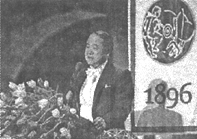题目内容
---It’s more and more important to protect our earth.
----I think so. If everyone ______a contribution to it, our world will be more beautifu..
| A.make | B.makes | C.will make | D.make |
B
解析


Chinese writer Mo Yan’s Nobel Prize for Literature might ignite an explosion of global interest in Chinese literature and lead to more titles translated into English, European experts say.
“Hopefully, the award means more people will read Chinese literature and more works will get translated,” says Michel Hockx, professor of the Languages and Cultures of China and Inner Asia from University of London. “Many very good Chinese writers have been accepted globally for a long time already. Mo Yan is probably the most translated Chinese writer alive, with at least five of his novels made available in English over the past 20 years.”
Jonathan Ruppin, web editor of bookseller Foyles, says Mo’s win coincides with growing interest in Chinese literature and recognizes the talents of a distinctive and visionary(富于幻想的)writer. “We are very excited by the fact that English translations of more of his books should now become available,” Ruppin says. He made the comment after Mo became the first Chinese citizen to win the Nobel Prize for Literature in its century-long history.
As East-West cultural exchange has been booming, Chinese literature has been attracting growing attention in recent years. Hockx explains, “It’s mainly because there are many more opportunities for Chinese writers to visit other countries, to publish their works outside China and to interact with readers abroad. At the same time, more and more people globally are learning Chinese and taking an interest in the Chinese language and culture.”
University of Oxford lecturer in modern Chinese literature Margaret Hillenbrand says, “The obvious reason for the growing global presence of Chinese literature is the growing global presence of China itself. People have come to realize that there is a serious knowledge deficit (缺少)between China and its international counterparts — in particular, China knows incomparably(无比地)more about Europe and America than the other way round — and reading Chinese literature is an effective, simple means of solving that gap.”
【小题1】The underlined word “ignite” in Paragraph 1 probably means “________”.
| A.start out | B.burn up | C.set off | D.appeal to |
| A.Chinese writers have been writing more and more books in English |
| B.the Chinese language has become the most widely used language in the world |
| C.the Chinese government attaches great importance to literature |
| D.the cultural communication between China and western countries has developed |
| A.Chinese literature has spread with the development of China. |
| B.The Nobel Prize for Literature has a history of hundreds of years. |
| C.In the past, no Chinese writers were accepted outside China. |
| D.Foreigners know about China mainly by reading Mo Yan’s works. |
| A.China knows more about Europe and America than before. |
| B.China knows more about Europe and America than they know about China. |
| C.China, Europe and America know one another more than before. |
| D.Compared with America, China knows more about Europe. |
Why do 33% of the households in the USA have cats? And how do you explain why there are 16 million more pet cats than dogs? Yes, kittens are adorable (讨人喜欢的).Yes, they can grow up to be good mousers and are very entertaining to watch.And yes, cats are independent and don't require as much care as dogs.But research shows cats can also be caretakers for us and our families, improve our health and teach us and our children to be kinder, gentler souls.
Theodora Wesselman is 94 and has lived the past two years with her elderly cat, Cleo, at TigerPlace, a retirement community in Columbia, Mo.Their enduring friendship is a classic example of how humans and animals can become family and look out for each other.
Wesselman visits other residents, and her children stop by, but Cleo is her best friend, she says.They've been together nearly 21 years.
"She sleeps on her own pillow right beside mine," Wesselman says."In the morning, she pecks on my cheek to wake me up.It's really sweet.I pet her, tell her I love her and take her to the kitchen to prepare her food."
Research shows that being able to care for a pet improves our morale (士气;精神状态), helps validate us and encourages us to take care of ourselves, says Rebecca Johnson, director of the University of Missouri's Research Center for Human-Animal Interaction.The body of research is leading more retirement communities and universities to roll out the welcome mat for pets.
1.According to the context, where do you think the sentence “They start and end the day together” should appear in the passage?
|
A.Between para.1 and para.2 |
B.Between para.2 and para.3 |
|
C.Between para.3 and para.4 |
D.Between para.4 and para.5 |
2.Which of the following words best describe the author’s attitude towards keeping pet cats?
|
A.Favorable |
B.Critical |
C.Reserved |
D.Doubtful |
3.Why does the author take 94-year-old Theodora Wesselman as an example in the passage?
|
A.To show that the elderly like Theodora Wesselman in the USA have pet cats. |
|
B.To suggest to what degree humans and pet cats can be caretakers for each other. |
|
C.Because Theodora Wesselman has been living with a pet cat for the past two years. |
|
D.Because Theodora Wesselman pets her cat Cleo and tells her she loves her. |
4.What does “to roll out the welcome mat for pets” in the last paragraph imply?
|
A.To give a special welcome to pets. |
|
B.To make the welcome mat flat on the ground for pets. |
|
C.To open out the welcome mat for pets to sleep. |
|
D.To wrap the welcome mat to make room for pets. |